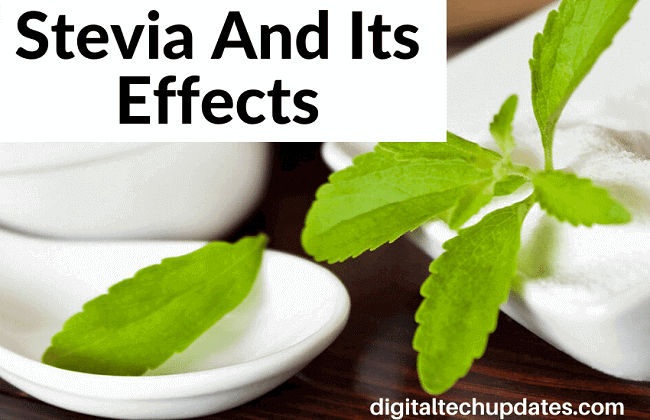An all-natural, calorie-free alternative to artificial sweeteners is now available to people, allowing them to satisfy their sugar cravings without adding extra calories. Once only available in health food stores, stevia is now widely available and is quickly replacing artificial
sweeteners in consumer goods. Despite being 30 times sweeter than sugar, stevia, a sugar-free sugar, has no impact on blood sugar and a little aftertaste.
But is stevia sugar-free? Read on to know more.
What is Stevia?
Stevia is a sugar alternative made from the stevia plant leaves. It has no carbohydrates, artificial elements or calories and is around 100-300 times sweeter than regular sugar.
Stevia is much like other zero-calorie sweeteners. With stevia sweeteners being 100-300 times sweeter than sugar, only trace quantities are required to provide the same level of sweetness as table sugar.
Food and beverage producers can incorporate stevia sweeteners into various products, including but not limited to: beverages (including light or low-sugar juices, diet sodas, and flavoured waters), condiments, canned fruits, dairy products (including flavoured milk, ice cream, and yoghurt), and other foods (including baked goods, chocolate, cereals, and other confections), and syrups.
Stevia sugar-free sugar may be used in baking since they don’t degrade when exposed to high heat. However, the outcome of a recipe may change significantly if stevia sweeteners are used instead of sugar. This is because sugar is used in many ways in recipes, including adding sweetness and changing the volume and texture of the final product.
How are stevia sweeteners manufactured?
The South American herbal shrub Stevia rebaudiana (Bertoni) leaves are used to make stevia sweeteners.
Leaves and crude extracts of the stevia plant have been marketed as a nutritional supplement for hundreds of years, and the plant itself has been used for food and medicine. Stevia sugar-free sugar is made by taking the steviol glycosides from stevia leaves and cleaning them up to get rid of some of the bitterness.
Does stevia contain sugars?
Is stevia sugar-free? Stevia is a sugar substitute. High-purity stevia extracts have undergone the stringent testing and scientific analysis required today for an ingredient to be certified for use in foods and drinks. High-purity stevia leaf extract has been deemed safe for human use as a sweetener by the world’s primary regulatory bodies. This includes people with diabetes, pregnant people, and children.
Stevia’s positive effects on health
Using stevia instead of sucrose or table sugar as a sweetener may be good for health.
- Weight management: Inactivity and a rise in the consumption of energy-dense meals heavy in fat and added sugars are two significant contributors to excess body weight. The World Health Organisation has suggested consuming sugars less than 10% of the total calorie consumption. More sugar intake may result in gaining weight and making it harder to keep blood sugar levels in check. Stevia is a natural sweetener that has no calories or sugar. It may be used in a healthy diet to help save calories without compromising the flavour.
- Diabetes: Those with diabetes need not worry about using stevia sweeteners since they are calorie- and carbohydrate-free. Furthermore, they have not been shown to affect blood sugar levels or the body’s sensitivity to insulin. This makes it possible for people with diabetes to follow a healthy diet and enjoy a more extensive range of foods.
- Stress levels: To increase blood flow, a sugar-free extract containing stevia glycosides must be used. They can also increase urination and salt loss. Furthermore, stevia may help lower blood pressure.
- Allergies: To ascertain whether there was a reason to worry about the possibility of allergic responses to stevia, the European Food Safety Committee (EFSA) examined the current literature in 2010. Since steviol glycosides “are not reactive and are not changed into reactive molecules,” the reviewers said it’s unlikely that these particular steviol glycosides would cause allergic reactions when eaten on their own in food.
- Nutritional needs of children: Stevia-containing foods and drinks may be useful tools to wean kids off sugar by providing a natural alternative to added sugar. Salad dressings and snack bars are just two examples of the hundreds of new products that contain stevia extracted from plants.
Final words
Many different healthy diets may include meals and drinks sweetened with stevia. Many foreign health organisations have recognised the safety of stevia sweeteners, which have been classified as GRAS in the United States since 2008.
Several studies have looked at the effects of low-calorie sweeteners and their links to chronic diseases, including obesity and type 2 diabetes. Due to methodological difficulties, including confounding and reverse causality, observational studies that relate low-calorie sweeteners to the risk of type 2 diabetes and weight gain cannot indicate a causal association.
Choosing a healthy, active lifestyle based on one’s values and objectives is critical to one’s health. Choosing meals and drinks sweetened with low- and no-calorie sweeteners like stevia sweeteners is one way to preserve health and lower the risk of lifestyle-related illnesses.




